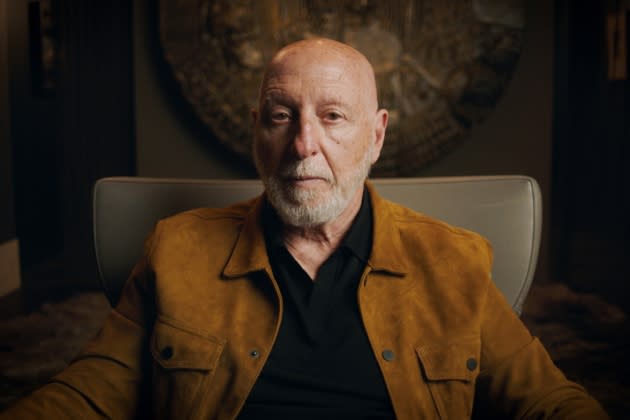Anthony Pellicano Doc ‘Sin Eater’ Revisits Chris Rock Rape Allegation

Money may very well equal power, but so does information — especially the dirty kind. Hollywood understands this. From The Sweet Smell of Success to L.A. Confidential, the movies are laden with bullying blackmailers and influence-peddlers using muscle and corruption to scrub the tainted and gain an upper hand. The dynamic, of course, is quite real, and the gripping new two-part documentary Sin Eater: The Crimes of Anthony Pellicano provides a fine if troubling look at how it works in contemporary showbiz.
The latest production from FX’s The New York Times Presents series, Sin Eater combines journalistic veracity with filmmaking polish to responsibly weave a salacious story. (Note: I contribute to the Times on a freelance basis). The star of the show is Pellicano, a self-styled tough-guy private investigator known for wiretapping his clients’ enemies and, the documentary strongly suggests, threatening them with physical harm. If those clients were named John and Jane Doe, we wouldn’t care much. But those who sought and accepted Pellicano’s help included high-powered attorneys (Bert Fields, Terry Christensen), industry moguls (Michael Ovitz, Brad Grey), and big stars (Michael Jackson, Chris Rock). Pellicano made himself a valuable commodity before he was sent to federal prison for charges including wiretapping, racketeering, wire fraud, and computer fraud.
More from Rolling Stone
In the first part of the documentary, we meet Pellicano primarily through audio he recorded himself and images of the fixer as a younger man, usually glaring at the camera through shades and flexing in designer suits. As he likes to remind anyone who will listen, he’s a Chicago Sicilian, and he places loyalty above all else. His heavily encrypted computer passwords ended with the word “omerta,” best known as the Mafia code of silence. Prison photos show him looking hard with his fellow inmates, just one of the guys.
He likes to call people “honey” and “baby.” He seems to think he’s starring in his own TV show, except the havoc he wreaked on the lives of others wasn’t scripted. We hear a recording of him, obtained by reporters via the FBI, discussing strategy with Rock after the comedian was accused of rape by Hungarian model Monika Zsibrita: “I want to blacken this girl up totally,” Pellicano tells Rock.
Zsibrita alleged that Rock sexually assaulted her in a room at Beverly Hills’ Four Seasons hotel in 1998. She also claimed that one of their trysts resulted in a child, but DNA tests proved otherwise. Rock denied the allegations, and was never charged with a crime, but entered into a confidential settlement agreement with Zsibrita, according to The Hollywood Reporter. In the recorded phone call between Pellicano and Rock, which is aired in the doc, the comic claims he was “set up,” and listens to Pellicano read from a confidential police report that he somehow obtained. “Chris Rock might not have broken any laws by listening to this, or responding to this, or using it in his defense. But certainly what the tape shows is that he raised no objection to, I’m not supposed to have this, let’s change your story,” The New York Times’ Rachel Abrams says in the doc.
Through interviews and analysis, Times journalists make the case: Pellicano, with paid contacts at the phone company and the Los Angeles Police Department, made a killing by making life hell for his targets. James Ellroy, the self-proclaimed “demon dog of crime fiction,” could have invented Pellicano for one of his tour-de-force sleazoid L.A. novels — if only the guy didn’t already exist.
Slickly produced and directed by John Pappas, Sin Eater is compulsively watchable even before Pellicano, now out of prison and in his late 70s after a 15-year sentence, makes his first contemporaneous appearance at the end of part one. Wearing a suede jacket, glaring into the camera with a “You think I care?” look in his eye, he spouts claims that Sin Eater has already refuted in detail. “I never went after innocent people.” “I never bullied anybody.” This would be news to, among others, journalist Anita Busch, who accused Pellicano and Ovitz of orchestrating a threat on her life that involved a smashed car windshield and a dead fish with a rose in its mouth (sleeps with the fishes and all that. The case was settled ahead of trial).

As it progresses, Sin Eater tells a story that goes well beyond Pellicano. Yes, he’s got all kinds of dirt on his hands, and he tapped so many phones he could join the fraternity of buggers in The Conversation. But he was also a weapon wielded by figures far more powerful than him. Consider, for a moment, Eddie Mannix, the famed MGM fixer during the studio system era. His job was to make scandals go away, casualties be damned. He was not a good person, and he ruined countless lives, often by illegal means. But he didn’t sign the checks. Louis B. Mayer did. For all of his sins, and sin-eating, Pellicano was small fish compared to many of the major players who hired him, on whom he refused to rat (remember, omerta). The documentary is particularly incredulous that Fields, the widely-feared Hollywood attorney and close Pellicano confidante enmeshed in the fixer’s wiretapping scandal, skated away without repercussion. A scant few, including Die Hard filmmaker John McTiernan and lawyer Christensen, did time for their involvement with Pellicano. The rest went on with their lives. They’re the ones who really make scandals go away.
Sin Eater is a case study in how to build a better true crime doc. It’s exciting, and it’s disturbing. But it’s also thrillingly journalistic, and it doesn’t take the audience’s intelligence for granted. Competitors would be wise to take notes. Just don’t tape any phone conversations.
Best of Rolling Stone


